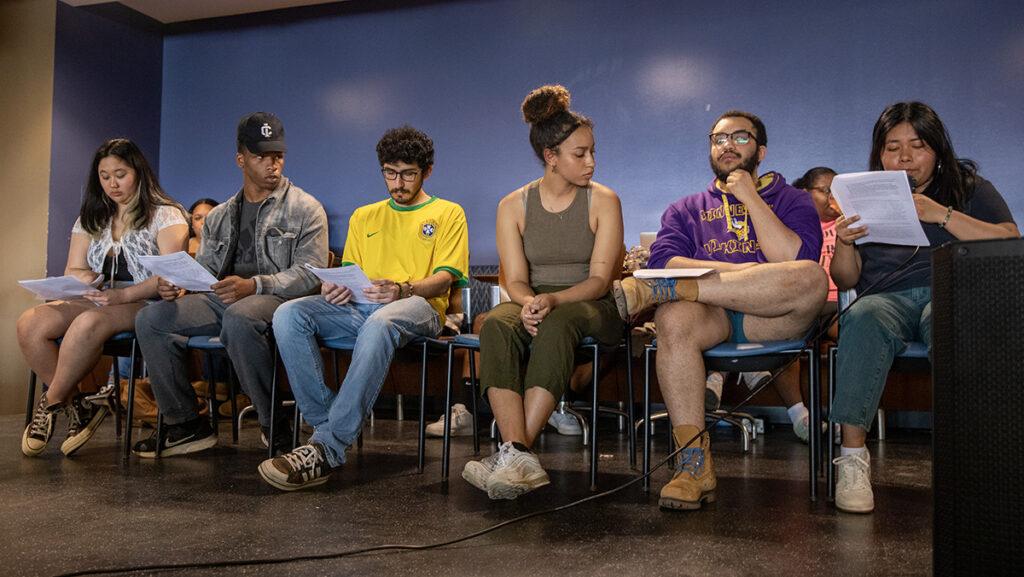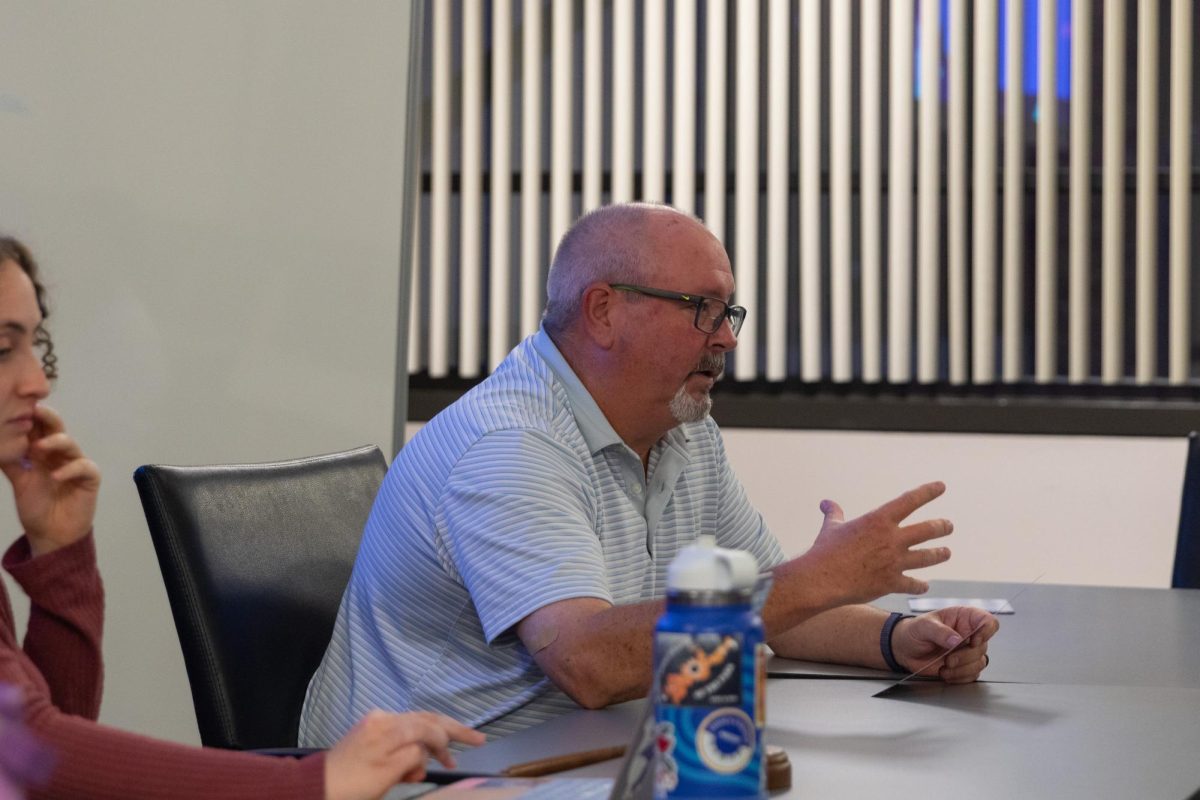[slideshow_deploy id=’47239′]
As members of the Ithaca College community gathered April 12 in the Campus Center, IC Rise Up distributed a list of eight demands for the college and proceeded to speak on each one.
1. “We demand course evaluations include a section for the classroom environment professors foster (particularly assessing inclusion and belonging).”
The document states that having course evaluations would give students the opportunity to speak on any racial discrimination they experience in the classroom and evaluate faculty from the perspective of intersectional identities. This would be accompanied by a section in the Faculty Handbook that acknowledges racial bias in classrooms and the impact it has on students of color.
“This demand is particularly important because oftentimes when POC are met with situations of racism, oftentimes we do not have the language to communicate it by virtue of not having accessibility to anything that validates these experiences,” senior Journey Singleton said.
2. “We demand a Critical Race Theory requirement for all majors in addition to existing diversity ICC requirements.”
The document states that learning about CRT — the recognition of race as a social construct and racism as a systemic issue rather than only an individual one — should be taught to all students at the college. It says the CRT requirement would support the college’s DEI statement and would foster a safer campus culture.
“[Students of color] are tired of our struggles being an optional class for those who participate in CRT,” first-year student Kendal Burno said. “It is the utmost important for everyone here to understand that struggle. This will help encourage us all to recognize racism as a pressing issue.”
3. “We demand a freshman seminar created for incoming students of color to prepare them for the reality of being a student of color at a predominantly white institution. (This includes all students of color, but especially those who enter IC through identity–based orgs. such as MLK Scholars, BOLD Women, HEOP Scholars, etc.)”
The document states that the professor of the seminar would help students of color in the transition between high school and college, especially at a PWI. The seminar would connect students of color with resources and validate their experiences. The document says creating safe spaces like this seminar would help retain students of color at the college.
4. “We demand peer leadership for students of color.”
The document states that junior and senior students of color could serve as mentors to first-year and sophomore students of color. This would help first-year students of color feel less alone and help foster connections among students of color within the community. A bigs and littles program would help younger students navigate being at a PWI and find a safe community of belonging among students of color. The document says a bigs and littles program would also help with the transfer rates and retention of students of color.
“Through the cycle of students being changed out every four years, the faculty and the administration at large have a very neat and clean opportunity to ignore their own histories of bias,” junior Achille Vann Ricca said. “Some of the only ways that we can actually help each other is if we are constantly in community with each other intergenerationally, if there are constantly people that are older, telling the people that are younger, ‘Hey, they have put us through this before. Do not get caught back in the cycle of meetings of nameless things.’ … So if IC is about what they say they’re about, they will provide spaces where our communities can function and circle and thrive outside of the listening ears of white people.”
5. “We demand funding set aside for aiding BIPOC students.”
The document states that a fund should be set aside for students of color who need assistance with necessities that would help them stay at the college, like rent, food and school supplies. This fund would account for socio-political and economic systems that oppress people of color.
“This school pays lip service to a lot of things that it espouses to be,” Vann Ricca said. “They know that if they exhaust us by saying, ‘Hey, we’re listening,’ and then not doing anything, we’ll get tired. … If you care about students of color, put your literal money where your mouth is.”
6. “A physical space designated for students of color on campus.”
- “We propose this space also has counselors of color for at least five hours a day to aid students during their time at IC, and to aid them in navigating their way through this PWI.”
- “We propose that this space has an ombudsman that can serve in investigating racial microaggressions and racist incidents. An ombudsman will serve to advocate for students and have their best interest in mind rather than that of the institution. This figure should be present for reporting at least twice a week for 6 hours each day.”
The document says this space, which should be open for at least 12 hours every day, would allow students of color to find a community and sense of belonging in a space meant for them. It would be conducive to relaxation and working while being able to exist in a space where students of color can be themselves. The African-Latino Society room is accessible to a limited number of students of color, and the document says the room should be open to all students of color through ID card access.
“Being at a PWI as a person of color is really isolating and it’s really hard to find your people,” senior Daisy Codallos-Silva said. “Having the space not only builds community, but it would actually allow us to have a space where we can actually go into the space because being on campus doesn’t feel safe, honestly. … People don’t understand how draining it is to be a person of color every day [in] an institution that makes you feel like you don’t belong or you’re not supposed to be here.”
7. “We demand anti-racism workshops for faculty. (once each semester minimum)”
The document states that faculty should be engaging in anti-racism workshops, in conjunction with meeting with an anti-racist workshop coordinator, to ensure classrooms facilitate a sense of belonging for students of color and address racial biases. These workshops would result in making teaching conducive to students of color, who are often marginalized by teaching practices.
“I don’t believe that any of these educators I had these [racist] experiences with are evil individuals who set out to harm BIPOC students, but [the] impact they had, I believe, stems from a place of ignorance and a lack of proper education on how to dismantle Anglican conformity and promote true belonging and racial justice,” first-year student Grace Jun Walton said. “We believe it’s essential for every faculty and administration member to organize and participate in workshops that will help the faculty improve their non-existent, lackluster and insufficient interactions with race in their classroom spaces.”
8. “We demand commitment to investigating bias reports and issues of racism that take place on campus.”
The document states the reports of racial discrimination on campus are not individual incidents, but rather part of a larger pattern within the college community. In order for students of color to feel safe on campus and be part of an environment where they can belong, the college needs to investigate bias reports and acknowledge acts of racism on campus.
“[Discrimination] happens all the time,” senior Thomas Attie said. “They happen every day and they happen to our faces. They’re blatant and simple. And why do we not see emails being thrown at us all the time? Why is it not acknowledged? This is a problem that must be solved with the active participation of everyone in this community because we, together, form a community.”
In a closing statement, Singleton asked for members of the campus community to reflect on the demands and their individual roles in perpetuating the racism and discrimination that exists on campus in order to truly bring about change.
“I just want to ask that you all reflect on the demands and reflect on yourself and the ways in which you may participate in racism on this campus,” Singleton said. “I’m not asking you to purge all of the horrible things that you’ve done to people but I’m asking you to be aware that our BIPOC community is hurting and that we exist on this campus and that our traumas exist on this campus.”








